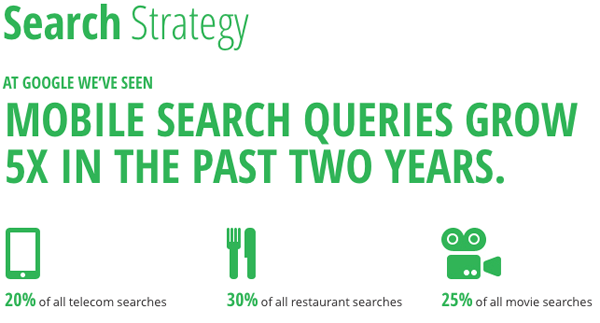How Location & Small Screen Size Impact Search Behavior On Mobile Devices
It is no news that mobile devices are rapidly taking over the Web! Latest estimates peg the share of mobile traffic from 10% to 20% of the total Web traffic. Popular websites like Quora and Facebook are claiming that about one quarter of their traffic comes from mobile devices (including tablets). With more and more […]
It is no news that mobile devices are rapidly taking over the Web! Latest estimates peg the share of mobile traffic from 10% to 20% of the total Web traffic. Popular websites like Quora and Facebook are claiming that about one quarter of their traffic comes from mobile devices (including tablets).
With more and more people having their primary Web experience on mobile devices, this platform cannot be ignored. In fact, companies that innovate specifically for mobile devices are the ones who will have an early lead for the next couple of years.
Eventually, every company will have to have a mobile strategy, so there’s no question of whether one should take mobiles seriously; the only question is when, and my answer to that would be: the sooner the better.

StatCounter’s data clearly shows how mobile share is steadily growing
There are two main aspects of mobile devices that differentiate them from desktops, laptops and other traditional computing devices. The first aspect is, of course, the portability factor. People access the Web on mobile devices when they are on the go. Hence, where they are and what they are doing becomes very pertinent to what kind of experience they expect.
The second aspect of mobiles is the screen size. Yes, with the launch of iPhone 5 and gigantic devices like Samsung Note and Galaxy SIII, I realize mobile screens are getting bigger; but they’re still nowhere near the standard 13’’-17’’ screens we have become comfortable with on our desktops and laptops.
A user experience that actually uses the constraints set by a smaller screen is the one that people would like on mobiles.
Search On The Mobiles
What I am most interested in exploring is how these two constraints affect traditional user experience on the Web. Specifically, I am interested in how search and conversion behavior changes.
Talking about search, about 15-20% of all searches on Google, Yahoo, Bing, etc., are from mobiles. So how does search behavior change on mobiles? Let’s see!
Search Behavior Due To Location
Research by Microsoft reported that about 30% of all mobile searches have a local intent, and Google reported that 61% of searches result in a phone call. Clearly, people accessing the Web on mobiles are interested in things around them.
Search engines already do a great job of customizing search results according to the user’s location, but if you are a local business, the least you can do is to specify your business’s location on various search engine’s Web master settings.
Search engines also pick location signals from the Title and other text present on a website. If you have a local business, it makes a lot of sense to emphasize the location on the website so the search engines will know it is an important aspect of your business and hence prioritize your website in search results whenever a user is around your location.
But what if your business is not limited to one location; can you still take advantage of a user’s location?
In such a case, you should be creating internal pages for various locations your business is present in, and you should also have a clear hierarchy starting from the homepage to signal search engines that these location specific internal pages are important, too.
Of course, the usual parameters (like speed, relevance, backlinks, etc.) that search engines consider in ranking a page still apply, but the idea is to get individual pages ranked for different locations your users may be searching from.
Search Behavior Due To Screen Size
As I said, the second aspect of search behavior is how it is affected by the small screen size we have on mobiles. There are practical and psychological constraints that change the way people search, interact with search results, and then visit the pages of interest.
The first and foremost difference between desktop and mobile search is in the paid results or advertisements. Due to the small size of the screen, typically the number of advertisements are far less on mobile devices as compared to desktops; so, organic results on mobiles become more important as compared to desktops.

Search results page on desktops
Another aspect of mobile search results is the number of results you can digest at one moment. On a typical mobile phone (I’m excluding tablets here), you would see a maximum of 3 or 4 search results above the fold.
See example below:

Search result page on mobile devices
Contrast it with the desktop, and you will realize that the attention on mobiles is concentrated on just the top three results, while on desktops you can take a broad glance and see which result interests you the most. This means getting to the top ten is no longer enough; what you are looking for is the top three.
Unlike desktops, where people sit comfortably and give a lot of time and attention to what they are searching for, mobile users are typically not in the research mode. So they are not as likely to go to page two and beyond of search results. In fact, they are more likely to refine their search terms than go on exploring the item they’re looking for.
An interesting paper from Google titled A Large Scale Study of Wireless Search Behavior: Google Mobile Search presented a number of relevant findings:
- Diversity of search queries is lesser as compared to desktop, but the nature of queries is similar
- It’s harder to type on a mobile, so users won’t spend indefinite time searching for something specific; rather, they would simply try some other means of getting the information they want
- The small screen size and unnatural keypad also means that the rate of exploration is low; users typically have specific search goals on the mobile
This means that search behavior on mobiles is definitely unique, and that impacts your SEO strategy. You, of course, don’t want to sacrifice your desktop website rankings for this, so a great way is to have a separate mobile website that is structured and optimized for the mobile user experience. There are some good articles on the Web that detail this practice called (pretty straightforwardly) “Mobile SEO.”
Hope you found this article useful. In upcoming articles I will write about how user behavior changes from a conversion perspective. That is, I will be exploring how users’ behavior changes once they land on your website and why it deserves to be treated specially.
Contributing authors are invited to create content for Search Engine Land and are chosen for their expertise and contribution to the search community. Our contributors work under the oversight of the editorial staff and contributions are checked for quality and relevance to our readers. The opinions they express are their own.
Related stories
New on Search Engine Land
